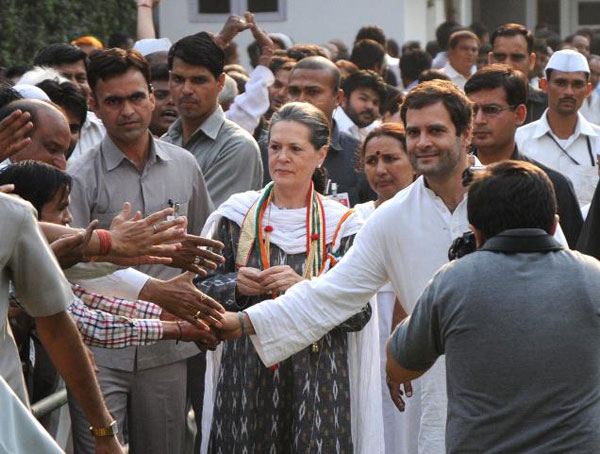
The Karnataka election results have been interpreted as the Bharatiya Janata Party’s defeat more than the Congress’ victory.
The vote share figures of the two parties (tentatively available) tend to support this theory. The BJP’s vote share declined by nearly 14 percentage points – down to 20 per cent from 33.86 per cent in 2008. While this conclusively establishes that voters massively revolted against the ruling party, there is no corresponding evidence to show the Congress’ popularity. The Congress, which won an absolute majority, added only 1.8 percentage points to its 2008 vote share of 34.76 per cent. The Janata Dal (Secular), which polled around 20 per cent, also gained only marginally, up just one percentage point from 2008.
In other words, the bulk of the anti-incumbency vote was captured by the two parties that broke away from the BJP, the B. S. Yeddyurappa-led Karnataka Janata Paksha (9.8 per cent) and the B. Sriramalu-led Badavara Shamikara Raitara Congress (2.7 per cent). Voters disenchanted with the BJP went to the breakaway factions rather than the Congress.
So far so good. But rewind to 2008. The breaking news in that election was the performance of the BJP, which swept into office capturing 110 seats for a vote share of 33.86 per cent.
In the previous assembly, the party had held 79 seats for a vote share of 28.33 per cent. An addition of 31 seats for a 5.53 percentage point vote gain was undoubtedly remarkable — more so coming from the BJP, which was dismissed till then as a Hindi heartland party.
But there was a catch in the election. Down and out as the Congress was, it still polled more votes than the BJP. The Congress registered a vote share of 34.76 per cent to the BJP’s 33.86 per cent. In other words, the BJP won handsomely despite being one percentage point behind the Congress.
By contrast, the Congress is not just ahead of the BJP this time round, it has a 15.7 percentage point lead over its rival. (1.8 percentage point swing in favour of the Congress plus 13.9 percentage point swing away from the BJP). A similar gap separates the Congress and the Janata Dal (secular). Despite this humongous gap, the Congress has finished with a modest tally of only 121 seats.
One reason for this is probably that the Congress’ vote is more spread out whereas its rivals, with narrower bases, tend to be beneficiaries of votes concentrated in specific regions.
The Congress was clearly unable to convert its votes into seats.The picture changes further if Karnataka is compared with Uttar Pradesh. Both states saw multi-cornered contests. However in the 2012 UP Assembly election, the Samajwadi Party hit the jackpot despite the BSP snapping at its heels. The SP and the BSP, the top two parties, were separated by a mere three percentage points.
In the 2007 state election in UP, the BSP became the first party in 16 years to get a majority by winning 206 seats for a vote share of 30.43 per cent. The corresponding figures for the SP were 97 seats for a vote share of 25.43 per cent. A five percentage point gap separated the two parties. Five years later, the picture was dramatically reversed though the vote difference between the big two was narrower. The BSP won 80 seats for a 26 per cent vote share. The SP swept the election with 224 seats though its vote share was only 29 per cent.
In a paper published in the Economic & Political Weekly, the Centre for the Study of Developing Societies attributed the seeming incongruity to “high seats-vote disproportionality in SP’s favour”. To quote: “Over the years, UP has seen multi-cornered contests where the leading party has benefited from the seat-vote proportionality, as the BSP did in 2007.” What this means is that when the competition is fierce, a small increase in vote share, or a small gap between the principal rivals, can convert into a high seat tally.
In a Karnataka-type situation, the SP, with a 16 point lead, would have probably wrapped up all 403 seats leaving nothing to its rivals.
Will Yeddyurappa’s return help?
The Karnataka verdict has also thrown up questions around possible realignments. Will Mr. Yeddyurappa’s return to the BJP — or an alliance between his KJP and the BJP — help the latter recover the ground it lost? Analysts tend to make future projections by simply adding the vote shares of different parties to arrive at a combined vote share. In the current case, the assumption is that the addition of KJP’s votes to the BJP will give the latter a minimum vote share of 29.8 per cent (BJP: 20% and KJP: 9.8%).
But this calculation is flawed because the KJP ambitiously contested 203 seats and polled its votes over this large catchment. This cannot be transferred wholesale to the BJP, which on its own contested all 223 seats.
The second problem here is the mismatch between the voter aspirations of the BJP and the KJP. Mr. Yeddyurappa’s party is widely perceived to have received the anti-incumbency, or the anti-BJP, vote. Indeed, this argument was the basis for the analysis that this election was the BJP’s defeat rather than the Congress’ victory.
Put simply, if the KJP secured its vote in opposition to the BJP, how can its anti-incumbency vote be added to the pro-incumbency vote of the BJP? To Mr. Yeddyurappa’s voters, he was the hero who demolished the BJP. Indeed, this has been his position in this election. A straight and clean vote transfer between the two assumes that not one of his voters will offer resistance, and together they will quietly follow him into the BJP.
The Yeddyurappa-BJP realignment is equally awkward for the BJP which ended its association with him citing corruption. With his return to the BJP, how will the latter target the Congress for corruption in 2014?
